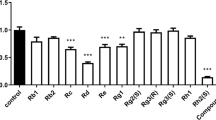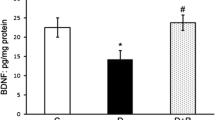Abstract
Grape seed proanthocyanidins (GSP) are known as condensed tannins and have been used as an anti-oxidant in various neurodegenerative diseases. In our study, GSP was used as a daily dietary supplement and the neuroprotective effects were evaluated on the retinal ganglion cells (RGCs) in the retinal tissues in glaucomatous DBA/2D (D2) mice. D2 mice and age-matched non-glaucomatous DBA/2J-Gpnmb+ (D2-Gpnmb+) mice were fed with GSP or a control diet for up to 6 months. The intraocular pressure (IOP), RGC survival, glial fibrillary acidic protein (GFAP), the levels of apoptotic proteins, and the expression of oxidative stress markers in retinal tissues were determined. In our study, the neuroprotective effects of GSP on retinal tissues were confirmed, as evidenced by (a) GSP inhibited the IOP elevation in D2 mice; (b) GSP enhanced RGC survival and mediated the apoptotic protein expression; (c) GSP suppressed GFAP expression; and (d) the oxidative stress and the levels of mitochondrial reactive oxygen species were regulated by GSP. Our findings indicate that GSP has promising potential to preserve retinal tissue functions via regulating oxidative stress and mitochondrial functions.





Similar content being viewed by others
References
Abu-Amero KK, Morales J, Bosley TM (2006) Mitochondrial abnormalities in patients with primary open-angle glaucoma. Invest Ophthalmol Vis Sci 47:2533–2541. https://doi.org/10.1167/iovs.05-1639
Alavi MV, Bette S, Schimpf S, Schuettauf F, Schraermeyer U, Wehrl HF, Ruttiger L, Beck SC, Tonagel F, Pichler BJ, Knipper M, Peters T, Laufs J, Wissinger B (2007) A splice site mutation in the murine Opa1 gene features pathology of autosomal dominant optic atrophy. Brain 130:1029–1042. https://doi.org/10.1093/brain/awm005
Almasieh M, Wilson AM, Morquette B, Vargas JLC, Di Polo A (2012) The molecular basis of retinal ganglion cell death in glaucoma. Prog Retin Eye Res 31:152–181. https://doi.org/10.1016/j.preteyeres.2011.11.002
Bagchi D, Bagchi M, Stohs SJ, Ray SD, Sen CK, Preuss HG (2002) Cellular protection with proanthocyanidins derived from grape seeds. Ann N Y Acad Sci 957:260–270. https://doi.org/10.1111/j.1749-6632.2002.tb02922.x
Baltmr A, Duggan J, Nizari S, Salt TE, Cordeiro MF (2010) Neuroprotection in glaucoma–is there a future role? Exp Eye Res 91:554–566. https://doi.org/10.1016/j.exer.2010.08.009
Cadenas E, Davies KJ (2000) Mitochondrial free radical generation, oxidative stress, and aging. Free Radical Biol Med 29:222–230. https://doi.org/10.1016/s0891-5849(00)00317-8
Chang EE, Goldberg JL (2012) Glaucoma 2.0: neuroprotection, neuroregeneration, neuroenhancement. Ophthalmology 119:979–986. https://doi.org/10.1016/j.ophtha.2011.11.003
Chidlow G, Wood JP, Casson RJ (2007) Pharmacological neuroprotection for glaucoma. Drugs 67:725–759. https://doi.org/10.2165/00003495-200767050-00006
Chrysostomou V, Rezania F, Trounce IA, Crowston JG (2013) Oxidative stress and mitochondrial dysfunction in glaucoma. Curr Opin Pharmacol 13:12–15. https://doi.org/10.1016/j.coph.2012.09.008
Dong L-Y, ** J, Lu G, Kang X-L (2013) Astaxanthin attenuates the apoptosis of retinal ganglion cells in db/db mice by inhibition of oxidative stress. Mar Drugs 11:960–974. https://doi.org/10.3390/md11030960
Douiev L, Abu-Libdeh B, Saada A (2018) Cytochrome c oxidase deficiency, oxidative stress, possible antioxidant therapy and link to nuclear DNA damage. Eur J Hum Genet 26:579–581. https://doi.org/10.1038/s41431-017-0047-5
Ekstrand MI, Falkenberg M, Rantanen A, Park CB, Gaspari M, Hultenby K, Rustin P, Gustafsson CM, Larsson N-G (2004) Mitochondrial transcription factor A regulates mtDNA copy number in mammals. Hum Mol Genet 13:935–944. https://doi.org/10.1093/hmg/ddh109
Gallego BI, Salazar JJ, De Hoz R, Rojas B, Ramírez AI, Salinas-Navarro M, Ortín-Martínez A, Valiente-Soriano FJ, Avilés-Trigueros M, Villegas-Perez MP, Vidal-Sanz M, Triviño A, Ramírez JM (2012) IOP induces upregulation of GFAP and MHC-II and microglia reactivity in mice retina contralateral to experimental glaucoma. J Neuroinflammation 9:92. https://doi.org/10.1186/1742-2094-9-92
Galpern WR, Cudkowicz ME (2007) Coenzyme Q treatment of neurodegenerative diseases of aging. Mitochondrion 7:S146–S153. https://doi.org/10.1016/j.mito.2007.01.004
Gherghel D, Griffiths HR, Hilton EJ, Cunliffe IA, Hosking SL (2005) Systemic reduction in glutathione levels occurs in patients with primary open-angle glaucoma. Invest Ophthalmol Vis Sci 46:877–883. https://doi.org/10.1167/iovs.04-0777
Huang W, Gao F, Hu F, Huang J, Wang M, Xu P, Zhang R, Chen J, Sun X, Zhang S, Wu J (2018) Asiatic acid prevents retinal ganglion cell apoptosis in a rat model of glaucoma. Front Neurosci. https://doi.org/10.3389/fnins.2018.00489
Huang W, Hu F, Sun X-H (2018) Asiatic acid prevents retinal ganglion cell apoptosis in a rat model of glaucoma. Front Neurosci 12:489. https://doi.org/10.3389/fnins.2018.00489
Izzotti A, Bagnis A, Saccà SC (2006) The role of oxidative stress in glaucoma. Mut Res-Rev Mut 612:105–114. https://doi.org/10.1016/j.mrrev.2005.11.001
Izzotti A, Longobardi M, Cartiglia C, Sacca SC (2011) Mitochondrial damage in the trabecular meshwork occurs only in primary open-angle glaucoma and in pseudoexfoliative glaucoma. PLoS ONE 6:e14567. https://doi.org/10.1371/journal.pone.0014567
Jia Z, Song Z, Zhao Y, Wang X, Liu P (2011) Grape seed proanthocyanidin extract protects human lens epithelial cells from oxidative stress via reducing NF-кB and MAPK protein expression. Mol Vis 17:210
Ju WK, Kim KY, Noh YH, Hoshijima M, Lukas TJ, Ellisman MH, Weinreb RN, Perkins GA (2015) Increased mitochondrial fission and volume density by blocking glutamate excitotoxicity protect glaucomatous optic nerve head astrocytes. Glia 63:736–753. https://doi.org/10.1002/glia.22781
Kim K, Perkins G, Shim M, Bushong E, Alcasid N, Ju S, Ellisman M, Weinreb R, Ju W (2015) DRP1 inhibition rescues retinal ganglion cells and their axons by preserving mitochondrial integrity in a mouse model of glaucoma. Cell Death Dis 6:e1839. https://doi.org/10.1038/cddis.2015.180
Koke JR, Mosier AL, García DM (2010) Intermediate filaments of zebrafish retinal and optic nerve astrocytes and Müller glia: differential distribution of cytokeratin and GFAP. BMC Res Notes 3:50–50. https://doi.org/10.1186/1756-0500-3-50
Lai R, **an D, **ong X, Yang L, Song J, Zhong J (2018) Proanthocyanidins: novel treatment for psoriasis that reduces oxidative stress and modulates Th17 and Treg cells. Redox Rep 23:130–135. https://doi.org/10.1080/13510002.2018.1462027
Lee D, Kim K-Y, Noh YH, Chai S, Lindsey JD, Ellisman MH, Weinreb RN, Ju W-K (2012) Brimonidine blocks glutamate excitotoxicity-induced oxidative stress and preserves mitochondrial transcription factor a in ischemic retinal injury. PLoS ONE 7:e47098. https://doi.org/10.1371/journal.pone.0047098
Lee D, Shim MS, Kim K-Y, Noh YH, Kim H, Kim SY, Weinreb RN, Ju W-K (2014) Coenzyme Q10 inhibits glutamate excitotoxicity and oxidative stress–mediated mitochondrial alteration in a mouse model of glaucoma. Invest Ophthalmol Vis Sci 55:993–1005. https://doi.org/10.1167/iovs.13-12564
Liu H-J, Pan X-X, Liu B-Q, Gui X, Hu L, Jiang C-Y, Han Y, Fan Y-X, Tang Y-L, Liu W-T (2017) Grape seed-derived procyanidins alleviate gout pain via NLRP3 inflammasome suppression. J Neuroinflammation 14:74. https://doi.org/10.1186/s12974-017-0849-y
Menet V, Ribotta MG, Chauvet N, Drian MJ, Lannoy J, Colucci-Guyon E, Privat A (2001) Inactivation of the glial fibrillary acidic protein gene, but not that of vimentin, improves neuronal survival and neurite growth by modifying adhesion molecule expression. J Neurosci 21:6147–6158. https://doi.org/10.1523/JNEUROSCI.21-16-06147.2001
Nguyen D, Alavi M, Kim K, Kang T, Scott R, Noh Y, Lindsey J, Wissinger B, Ellisman M, Weinreb R (2011) A new vicious cycle involving glutamate excitotoxicity, oxidative stress and mitochondrial dynamics. Cell Death Dis 2:e240–e240. https://doi.org/10.1038/cddis.2011.117
Osborne NN, Del Olmo-Aguado S (2013) Maintenance of retinal ganglion cell mitochondrial functions as a neuroprotective strategy in glaucoma. Cur Opin Pharmacol 13:16–22. https://doi.org/10.1016/j.coph.2012.09.002
Pajuelo D, Quesada H, Díaz S, Fernández-Iglesias A, Arola-Arnal A, Bladé C, Salvadó J, Arola L (2012) Chronic dietary supplementation of proanthocyanidins corrects the mitochondrial dysfunction of brown adipose tissue caused by diet-induced obesity in Wistar rats. Br J Nutr 107:170–178. https://doi.org/10.1017/S0007114511002728
Pan C, Wang C, Zhang L, Song L, Chen Y, Liu B, Liu W-T, Hu L, Pan Y (2018) Procyanidins attenuate neuropathic pain by suppressing matrix metalloproteinase-9/2. J Neuroinflammation 15:187. https://doi.org/10.1186/s12974-018-1182-9
Rauf A, Imran M, Abu-Izneid T, Iahtisham Ul H, Patel S, Pan X, Naz S, Sanches Silva A, Saeed F, Rasul Suleria HA (2019) Proanthocyanidins: a comprehensive review. Biomed Pharmacother 116:108999. https://doi.org/10.1016/j.biopha.2019.108999
Rozovsky I, Wei M, Morgan TE, Finch CE (2005) Reversible age impairments in neurite outgrowth by manipulations of astrocytic GFAP. Neurobiol Aging 26:705–715. https://doi.org/10.1016/j.neurobiolaging.2004.06.009
Sasaki M, Ozawa Y, Kurihara T, Kubota S, Yuki K, Noda K, Kobayashi S, Ishida S, Tsubota K (2010) Neurodegenerative influence of oxidative stress in the retina of a murine model of diabetes. Diabetologia 53:971–979. https://doi.org/10.1007/s00125-009-1655-6
Shokolenko I, Venediktova N, Bochkareva A, Wilson GL, Alexeyev MF (2009) Oxidative stress induces degradation of mitochondrial DNA. Nucleic Acids Res 37:2539–2548. https://doi.org/10.1093/nar/gkp100
Song P, Wang J, Bucan K, Theodoratou E, Rudan I, Chan KY (2017) National and subnational prevalence and burden of glaucoma in China: a systematic analysis. J Glob Health 7:020705. https://doi.org/10.7189/jogh.07.020705
Srinivasan S, Avadhani NG (2012) Cytochrome c oxidase dysfunction in oxidative stress. Free Radical Biol Med 53:1252–1263. https://doi.org/10.1016/j.freeradbiomed.2012.07.021
Tan BL, Norhaizan ME, Winnie-Pui-Pui Liew HS (2018) Antioxidant and oxidative stress: a mutual interplay in age-related diseases. Front Pharmacol 9:1162. https://doi.org/10.3389/fphar.2018.01162
Toops KA, Hagemann TL, Messing A, Nickells RW (2012) The effect of glial fibrillary acidic protein expression on neurite outgrowth from retinal explants in a permissive environment. BMC Res Notes 5:693. https://doi.org/10.1186/1756-0500-5-693
Wang J-Y, Wen L-L, Huang Y-N, Chen Y-T, Ku M-C (2006) Dual effects of antioxidants in neurodegeneration: direct neuroprotection against oxidative stress and indirect protection via suppression of gliamediated inflammation. Curr Pharm Des 12:3521–3533. https://doi.org/10.2174/138161206778343109
Weinreb RN, Khaw PT (2004) Primary open-angle glaucoma. The Lancet 363:1711–1720. https://doi.org/10.1016/S0140-6736(04)16257-0
Yang H, Lee BK, Kook KH, Jung Y-S, Ahn J (2012) Protective effect of grape seed extract against oxidative stress-induced cell death in a staurosporine-differentiated retinal ganglion cell line. Curr Eye Res 37:339–344. https://doi.org/10.3109/02713683.2011.645106
Zhao RZ, Jiang S, Zhang L, Yu ZB (2019) Mitochondrial electron transport chain, ROS generation and uncoupling (Review). Int J Mol Med 44:3–15. https://doi.org/10.3892/ijmm.2019.4188
Zhao Y-M, Gao L-P, Zhang H-L, Guo J-X, Guo P-P (2014) Grape seed proanthocyanidin extract prevents DDP-induced testicular toxicity in rats. Food Funct 5:605–611. https://doi.org/10.1039/c3fo60486a
Acknowledgements
This study was supported by 2019 **ing Medical College Teachers Scientific Research Support Fund Project (JYFC2019FKJ144).
Author information
Authors and Affiliations
Corresponding author
Ethics declarations
Conflict of interest
The authors declared they have no conflict of interest.
Additional information
Publisher's Note
Springer Nature remains neutral with regard to jurisdictional claims in published maps and institutional affiliations.
Electronic supplementary material
Below is the link to the electronic supplementary material.
Rights and permissions
About this article
Cite this article
Li, L., Geng, X., Tian, L. et al. Grape seed proanthocyanidins protect retinal ganglion cells by inhibiting oxidative stress and mitochondrial alteration. Arch. Pharm. Res. 43, 1056–1066 (2020). https://doi.org/10.1007/s12272-020-01272-9
Received:
Accepted:
Published:
Issue Date:
DOI: https://doi.org/10.1007/s12272-020-01272-9




